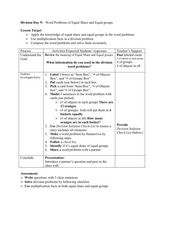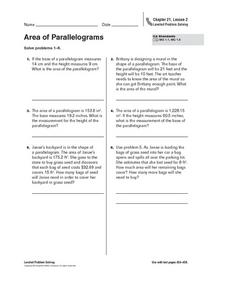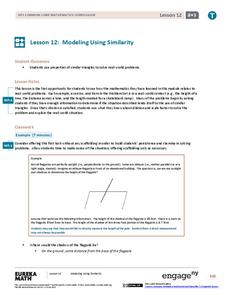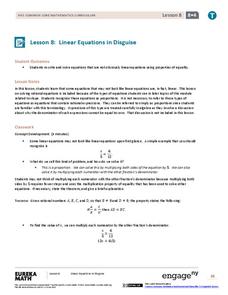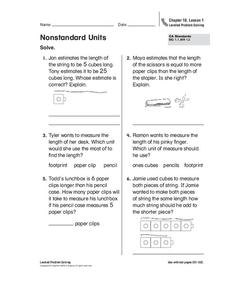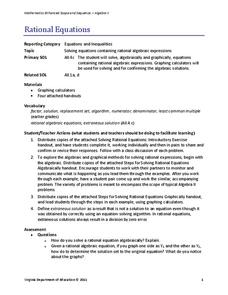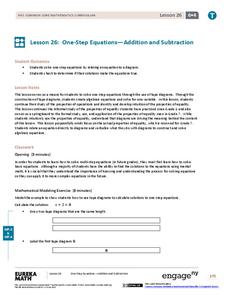Curated OER
Justifying Answers
Young scholars demonstrate how to solve word problems. In this problem solving lesson, students use strategies such as drawing pictures, using counters, and making a table to justify how they solved the word problem.
Curated OER
Problem-Solving Application: Choosing Reasonable Answers
For this reasonable answers worksheet, 1st graders apply their knowledge of how to select the most reasonable answer regarding the appropriate tool to use for measurement of different objects. There are 4 problems to solve.
Curated OER
Word Clue and All About Me Problem Solving
Fifth graders practice solving word problems using highlighted strategies. In this word problem lesson, 5th graders brainstorm and use words as clues that indicate the math operations that will be used to solve problems. They use the...
Curated OER
Word Problems of Equal Share and Equal Groups
Fourth graders solve multiplication word problems. In this multiplication problem solving activity, 4th graders view an example of how to group objects in a word problem. Students practice solving these word problems with partners and...
Curated OER
One Dollar
In this money practice learning exercise, students sharpen their problem solving skills as they solve 6 story problems that involve sums of 1 dollar.
Curated OER
Using Negative Numbers
Sixth graders practice using negative numbers by completing number equations. In this math problem solving lesson plan, 6th graders discuss the different ways negative numbers can be used in a math problem and practice completing...
Curated OER
Area of Parallelograms - Lesson 2
Use this area of parallelograms practice worksheet to have learner ssharpen their problem solving skills as they solve six story problems.
Curated OER
Problem Solving
Scholars will learn to solve word problems using addition, subtraction, multiplication or division. Using a grocery store theme, they will identify the best way to solve real-life problems. There are many ways this basic instructional...
Curated OER
Area of Triangles - Word Problems
Here is an area of triangles practice worksheet in which learners sharpen their problem solving skills as they solve six story problems.
Curated OER
Area of Parallelograms - Lesson 1
Here is an area of parallelograms practice activity in which learners sharpen their problem solving skills as they solve six story problems.
Pennsylvania Department of Education
Problem Solving by Using Multiplication to Solve Division Problems
Learners use index cards, counting cubes, and their own understanding to identify how division problems can be solved by using multiplication. In this division lesson plan, students use their multiplication skills to solve division...
EngageNY
Applications of Systems of Equations and Inequalities
Is the application of systems of equations giving your class headaches? Use this resource to build on your pupils' logic to lead them to building equations and using algebraic methods. The instructional activity begins with an...
EngageNY
Modeling Using Similarity
How do you find the lengths of items that cannot be directly measured? The 13th installment in a series of 16 has pupils use the similarity content learned in an earlier resource to solve real-world problems. Class members determine...
EngageNY
Introduction to Simultaneous Equations
Create an understanding of solving problems that require more than one equation. The lesson introduces the concept of systems of linear equations by using a familiar situation of constant rate problems. Pupils compare the graphs of...
EngageNY
Putting the Law of Cosines and the Law of Sines to Use
Use the Law of Cosines and the Law of Sines to solve problems using the sums of vectors. Pupils work on several different types of real-world problems that can be modeled using triangles with three known measurements. In the process,...
EngageNY
Linear Equations in Disguise
In the eighth segment of a 33-part unit, learners look at equations that do not appear to be linear at first glance. The equations are proportions where the numerators and denominators may have more than one term. To round out the...
Curated OER
Skate Party
Learners use the Frayer model during problem solving. In this problem solving instructional activity, they examine multiple methods of data collection to solve real world problems. Resources are provided.
Mathematics Assessment Project
Comparing Strategies for Proportion Problems
Having problems with proportions? Then solve these proportion problems with an exercise that asks learners to first individually solve a set of problems involving ratios and proportional reasoning. Groups then discuss provided sample...
Mathematics Assessment Project
Deducting Relationships: Floodlight Shadows
Try to figure out what happens with shadows as a person moves between two light sources. A formative assessment lesson has individuals work on an assessment task based on similar triangles, then groups them based on their assessment...
EngageNY
Finding One Hundred Percent Given Another Percent
Class members solve problems to find the whole when given a percent. They use double line numbers and factors of hundred to help break the 100 percent into equal segments.
Curated OER
Nonstandard Units
Measuring length with nonstandard units is the focus of this word problem activity. Youngsters problem solve using cubes, paper clips, footprints, and pencils. They solve six problems.
Virginia Department of Education
Rational Equations
Provide guidance and practice of the useful skill: solving rational equations using both an algebraic and graphical approach. Pupils solve increasingly more difficult rational equations using algebraic methods. After, they study steps to...
EngageNY
One-Step Equations—Addition and Subtraction
Just one step is all you need to find success in solving equations. The 27th installment in a series of 36 teaches how to solve one-step equations involving addition and subtraction. Tape diagrams help future mathematicians in this task.
EngageNY
Modeling with Inverse Trigonometric Functions 1
Where should I stand to get the best view? Pupils use inverse trigonometric functions to determine the horizontal distance from an object to get the best view. They round out the lesson by interpreting their answers within context.





